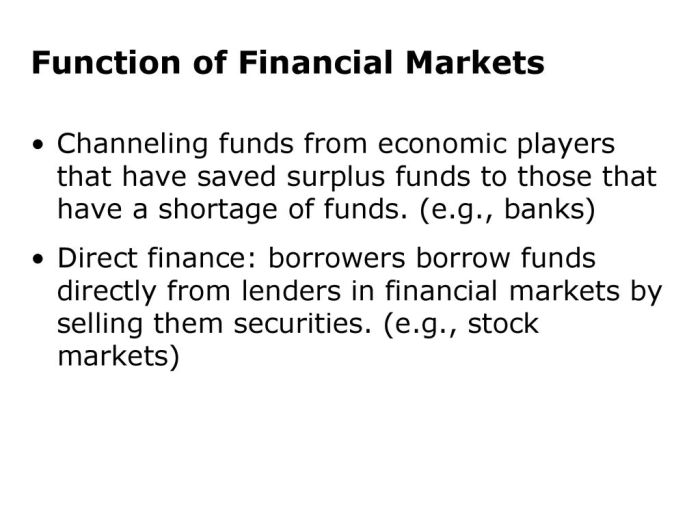Financial markets channeling funds quick check: Delve into the intricate world of financial markets and their pivotal role in facilitating the flow of funds, fostering economic growth, and ensuring financial stability. This comprehensive guide provides a concise overview, engaging insights, and practical applications of financial markets channeling funds.
Financial markets serve as a bridge between savers and borrowers, enabling the efficient allocation of capital and fueling economic development. Understanding how financial markets channel funds is crucial for individuals, businesses, and policymakers alike.
1. Define Financial Markets

Financial markets are marketplaces where buyers and sellers of financial assets, such as stocks, bonds, and foreign exchange, come together to trade. They facilitate the flow of funds from savers to borrowers and play a crucial role in economic growth and development.
Purpose and Functions of Financial Markets
Financial markets serve several important functions:-
- Capital Formation:Financial markets provide a platform for businesses and governments to raise capital by issuing securities, such as stocks and bonds.
- Risk Transfer:Financial markets allow individuals and institutions to transfer risk by trading financial instruments, such as derivatives.
- Price Discovery:Financial markets determine the prices of financial assets through the interaction of buyers and sellers, reflecting the market’s assessment of their value.
Types of Financial Markets
There are various types of financial markets, each specializing in different types of financial assets:-
- Stock Markets:Where stocks, representing ownership in publicly traded companies, are bought and sold.
- Bond Markets:Where bonds, representing debt obligations, are issued and traded.
- Foreign Exchange Markets:Where currencies are exchanged and traded.
2. Describe the Process of Channeling Funds: Financial Markets Channeling Funds Quick Check
Financial markets play a central role in channeling funds from savers to borrowers. Savers invest their money in financial assets, such as stocks or bonds, while borrowers use the funds raised in financial markets to finance their activities, such as business investments or government spending.
Role of Financial Intermediaries
Financial intermediaries, such as banks and investment firms, facilitate the channeling of funds. They act as intermediaries between savers and borrowers, providing services such as:-
- Pooling Funds:Banks and investment firms collect funds from multiple savers and pool them together, making them available for lending to borrowers.
- Risk Assessment:Financial intermediaries assess the creditworthiness of borrowers and determine the terms of lending.
- Market Access:Financial intermediaries provide borrowers with access to financial markets, helping them raise capital.
3. Analyze the Impact of Channeling Funds on the Economy
Channeling funds through financial markets has a significant impact on the economy:
Economic Growth and Development
–
- Capital Formation:Financial markets facilitate capital formation by providing businesses with access to funds for investment and expansion.
- Innovation:Financial markets encourage innovation by providing funding for new ventures and technologies.
Economic Stability
–
- Risk Sharing:Financial markets allow individuals and institutions to diversify their portfolios, reducing overall risk in the economy.
- Liquidity:Financial markets provide liquidity, allowing investors to quickly convert their assets into cash, which is essential for economic stability during periods of financial stress.
4. Identify Challenges and Opportunities in Channeling Funds

Financial markets face challenges in channeling funds effectively:
Challenges
–
- Information Asymmetry:Borrowers may have more information about their creditworthiness than lenders, leading to adverse selection.
- Market Volatility:Financial markets can be volatile, leading to fluctuations in asset prices and making it difficult for borrowers to raise capital.
Opportunities, Financial markets channeling funds quick check
–
- Technological Advancements:Technology can improve information flow and reduce transaction costs, enhancing the efficiency of financial markets.
- Regulatory Reforms:Governments can implement regulations to reduce information asymmetry and market volatility, improving the stability and effectiveness of financial markets.
5. Create a Table Summarizing the Key Features of Financial Markets

| Feature | Stock Markets | Bond Markets | Foreign Exchange Markets |
|---|---|---|---|
| Assets Traded | Stocks | Bonds | Currencies |
| Participants | Investors, companies | Investors, governments | Banks, corporations |
| Purpose | Capital formation, risk transfer | Capital formation, income generation | Currency exchange |
Questions Often Asked
What are the key functions of financial markets?
Financial markets facilitate capital formation, price discovery, risk management, and liquidity provision.
How do financial intermediaries contribute to channeling funds?
Financial intermediaries, such as banks and investment firms, act as intermediaries between savers and borrowers, reducing information asymmetry and transaction costs.
What are the challenges faced by financial markets in channeling funds?
Financial markets face challenges such as information asymmetry, market volatility, and regulatory complexities.